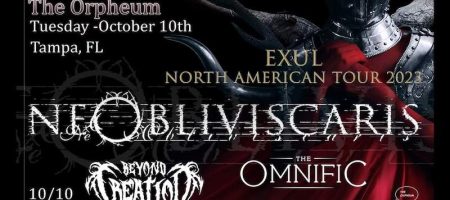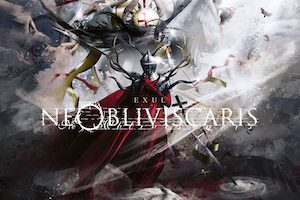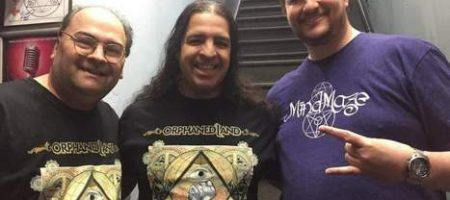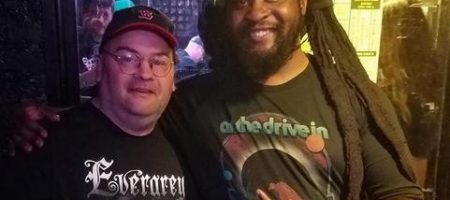Ne Obliviscaris – The Virtue of Patience
Wednesday, 13th December 2017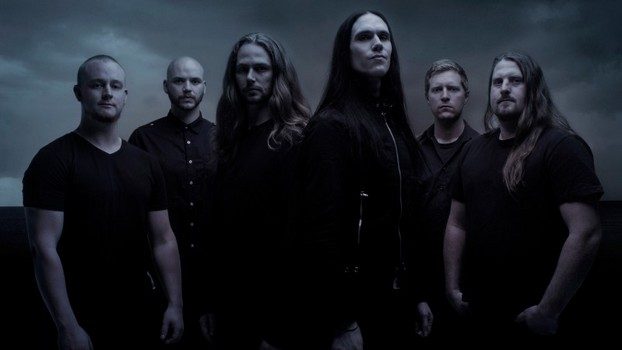
When it comes to the progressive metal scene, one band that has really made a name for themselves in the last few years is that of Autralia’s Ne Obliviscaris. With their brand of challenging, intricate, and playful yet aggressive music (which does include prevalent violin use), they’ve been a band that many have looked towards in their generation of a unique and interesting sound. There’s no doubt, that after three albums at this point, they can be considered among the more forward thinking acts of this generation of heavy metal.
The band recently released their third effort Urn, which embraces what they have achieved in previous releases as well as continues to push their sound into even greater dynamics and directions. We sat down with (harsh) vocalist Xenoyr for a few minutes before their recent performance at (le) poisson rouge in New York City to Urn, their knack for writing long songs (and playing them live), as well as their ventures into Patreon territory in recent years.
Dead Rhetoric: In terms of Urn, do you feel that you have been able to expand the band, either musically or in terms of the fanbase?
Xenoyr: With our band, we have always had a diverse fanbase already. With the new album, I think we cover a few other areas as well as taking a bit from Portal of I and Citadel. I think there’s a bit of something else involved with Urn, so we have expanded a little bit. I think there’s a bit more exploring. I think we have been getting a broader, and bigger fanbase in terms of age as well.
Dead Rhetoric: Last year, when Cradle of Filth was having visa issues at the start of your tour with them, you did a few very last minute headline dates. Were you surprised at the response that you got at those shows, considering the lack of prep time?
Xenoyr: Yeah, I can’t remember how many shows there were…I think it was like 5, while Cradle was trying to get into the US. It was a nice surprise to know that people were waiting to see us, and people traveled quite far to see a headline show. Being a support to a bigger band, people may not necessarily want to pay to go to see a 30-minute set. So a lot of people actually traveled to see a full headline set from us. It was a nice surprise and it gave us the impression that we might do alright in the US. That’s why we keep coming back. Each time we come here, it’s really overwhelming. We originally thought our sound was more European-oriented, as our label did as well, but we’ve found that the US seems to be our biggest fanbase at the moment, which is really surprising.
Dead Rhetoric: I know that you guys, within the metal scene, were one of the first to really embrace Patreon. Has it been a success in allowing you to focus on the music a bit more than you were before?
Xenoyr: Absolutely. Patreon has definitely helped us. This is our third time in the US within a year and a half or two years. Without that, we wouldn’t have been able to come at least two of those times. It’s allowed us to cut back on our jobs. No one wants to employ someone who is going to go out on tour a couple of months [after being hired], so it has allowed us to not stress so much and focus on writing – earning extra money on the side when we need to. Patreon has been very beneficial for us, and the support from all the people…without that, we probably wouldn’t be talking right now.
Dead Rhetoric: I know that there are extra hardships for you, coming from Australia. In order to go anywhere, it’s expensive regardless of where you head out to.
Xenoyr: Before we leave the country, with flights to Europe for everyone, you are automatically $14,000 down in debt, before you leave. That’s just flights. It’s a long way from Australia. That’s essentially why Australian bands don’t get to tour overseas too much, since there’s such a loss before even leaving the country. Can they be successful and make money on a tour? It’s a really big risk.
Dead Rhetoric: With the Ne Obliviscaris sound itself, how important is the role of the violin?
Xenoyr: I think the violin has always been important. It’s something I wanted from the start. I wanted either a cello or a violin, and it’s a sound that I’ve always loved. I wanted to integrate it into our sound, not necessarily as a lead instrument, but one that is as important as any other instrument in our band. Without that, we wouldn’t sound the same. It creates an extra dynamic – Tim [Charles] experiments and it gives him a sense that it could be more of a discordant sound or have an overall elegance to it. I think without it, I don’t think we would be near as popular. Not that we care too much about it, but we write all these instruments because it’s what we want our overall sound to accommodate.
Dead Rhetoric: It adds a unique sound without it taking complete control.
Xenoyr: We have violin solos, but I think it’s become just as important as rhythm guitar for some sections as well.
Dead Rhetoric: Many of your songs are very long. How do you maintain and compose something of that length and still keep listeners’ interest? Is there a certain tactic that you use when you are writing?
Xenoyr: When we write, we don’t necessarily have a formula that we go by. It’s not something that really appeals to us, otherwise we’d be writing songs with primarily verse-chorus-verse-chorus, and we aren’t interested in that. That gets redundant after a while. We like songs that go on a journey and they explore themselves overall. When we write, we go by feel and we are very open-minded people. We listen to a very broad variety of styles, and with all that there’s no way to actually write a short song. It’s not actually possible for us to write a short song.
Dead Rhetoric: Do you feel that aspect challenges your listeners?
Xenoyr: Yes, it does. It probably challenges a lot of people. To some degree it probably puts off a certain amount of listeners as well. It depends on what music you listen to – if you are into thrash and that sort of thing, it’s pretty straight-forward and catchy to start with. They may not be interested in something that’s a bit more long-winded like we are. We probably require a bit more patience to get through it. Our albums can’t really be absorbed in one listen. You need to sit down and digest them, and then go through it again and again. Eventually it makes sense, and people come to understand each part. It’s complex, but it does require patience.
Dead Rhetoric: So you are looking for more open-minded people to start, in terms of fans.
Xenoyr: Anyone that listens to us is a pretty open-minded person. I grew up on black metal and that sort of thing. I don’t listen to much progressive music at all. But this band has taught be to be more open-minded and gives me an idea of how a musician works in certain fields. It’s been an opening experience for me to be in the band, and learn a lot about myself. I guess it’s been a big learning process, but I’ve found, as I mentioned earlier, that we get people from all walks of life. We get classical students who come purely to see how the violin is implemented in what we do.
Dead Rhetoric: As we have discussed the longer songs – when you have the opportunity to play a longer, 90-minute set, what do you think of in terms of keeping things interesting? Do you find that the live energy carries over?
Xenoyr: I think our music translates quite well live – we have a lot of ups and downs in our sound. It’s not like a prolonged Cannibal Corpse concert, where it’s brutal from start to finish. There’s nothing wrong with that – but for us, the ups and downs live carry across really well. It’s different; it’s light and dark, it’s extreme, it’s acoustic at some points. I think the variation keeps people interested. 90-minutes is a long set for us, and this is our seventh show [in a row]. I’m looking forward to a day off to rest my voice [laughs]. But I think it translates very well.
In terms of sound, it’s something we wanted to create with Urn, in regards to having the mixing and mastering process – we had Mark Lewis, who had done work with Cannibal Corpse and The Black Dahlia Murder. We had, over the past year of touring, a lot of people telling us that we sound a lot heavier live. We kind of agreed, in looking back at videos and things, and we wanted to translate that heavy feel to Urn. I think overall, Mark Lewis did a good job of getting that heaviness out of us, which we didn’t necessarily have on those first two albums. I listen back to Portal of I, and to me, it doesn’t sound heavy at all. So we are looking for that almost live kind-of energy on the album.
Dead Rhetoric: In terms of the way you are moving forward, you have the Patreon and things like that. Are you trying to stay one step ahead in the way that things are changing within the music industry?
Xenoyr: I think with Patreon, it’s given us a good leg up to see where we are at, in terms of our fans and what interests people. We’ll be focusing on that over the course of the next year, especially with all of the touring that we are doing. We have certain tiers within Patreon where fans can come to soundcheck and that sort of thing. We are trying to involve fans a lot more in what we do, to show them that the music industry isn’t all glamorous and everything. It’s a lot of hard-work, and we are just like everybody else. I think at the moment, it’s just Patreon and a lot of touring going forward across Australia, Europe, and probably back here as well. After that we will see what the next venture is.











